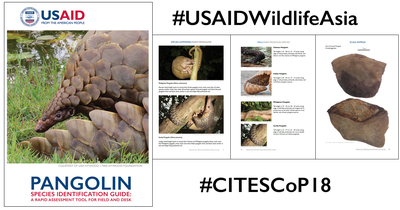USAID’s Pangolin Species Identification Guide Is Now Widely Used by Law Enforcers
Pangolins are considered the world’s most trafficked mammal, with over a million of them poached in the last decade. Despite being protected by national and international law, three out of eight species of pangolin are critically endangered, two are endangered, and all are recorded as declining in the wild by the International Union for Conservation of Nature Red List of Threatened Species. The guidebook helps equip law enforcement officers to succeed in combating this environmental crime.
The guidebook was recently featured by the IUCN, which linked to USAID Wildlife Asia’s one-stop shop portal for the guidebook as well as the smart phone application, and resource posters: https://www.usaidwildlifeasia.org/pangolin-guide
USAID Wildlife Asia’s work on developing the guidebook was commended by the Convention on International Trade in Endangered Species of Wild Fauna and Flora (CITES) Conference of Parties 18, which made the electronic versions of the guidebook available in the CITES Virtual College, the World Customs Organization Environet platform, and more widely disseminated it among the International Consortium on Combating Wildlife Crime partner organizations.
The Pangolin Species Identification Guide has been printed and distributed to dozens of relevant government offices in the region such as Customs, Forestry, Agriculture and Rural Development, Border Control, and the Environmental Police. It is now available in 10 languages: English, Chinese, French, Portuguese, Malay, Thai, Vietnamese, Lao, Khmer, and Indonesian.
USAID Wildlife Asia is also working to reduce the demand for wildlife and wildlife products such as the pangolin through targeted campaigns. This includes highlighting specific provisions in China’s new Wildlife Protection Law which prohibits and penalizes the consumption of pangolin meat.(“Learning About China’s Wildlife Protection Law – Pangolin and Tiger” is available on YouTube: https://www.youtube.com/watch?v=murU21MAURs)#


